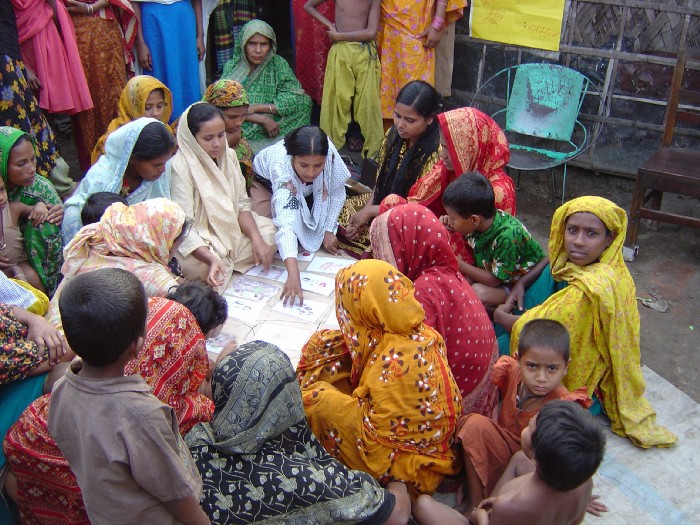By Alix Lebec, Former Chief Investor Relations Officer, WaterEquity
As we celebrate International Women’s Day, Week, Month, Era as well as World Water Day; let me introduce you to Chim Chany, an entrepreneurial and brave woman I recently met in Cambodia, while traveling for WaterEquity.
With a daily income of $2–8 a day, Chim Chany and her family struggled to pay the $26 a month needed for an un-safe water connection contaminated with arsenic. Long-term exposure to low levels of arsenic in drinking water is known to cause cancer, heart disease, and some evidence suggests lower IQ scores in children.
It shouldn’t come as a surprise that drinking this contaminated water caused Chim Chany’s family to become frequently ill. Seeing this, Chim Chaney decided to take the matter into her own hands and change her family’s circumstances. She met with a local microfinance bank and took out a small loan to pay for the construction of a safe water connection in her home.
The results are impressive — Chim Chany easily repaid her loan in one year, her monthly water bill is now $7, and her family is no longer sick. She now runs her own business, sends her children to school, and contributes to her community’s economic growth.
An investment in safe water changes everything.
On this trip, I also met with the local utility who had set up Chim Chany’s safe water connection. With a $500,000 loan under more favorable terms, the utility told me that they could double their coverage area — reaching more people with life-saving safe water. This investment potential and the experience of people like Chim Chany, inspired us to launch WaterEquity, the world’s first impact investment manager dedicated to investing in high-growth and socially-driven businesses serving the water and sanitation needs of the poor.
WaterEquity is working.
Our inaugural Fund successfully invested in seven microfinance institutions in India to scale their water and sanitation loan portfolios for the poor. To date, this $11 million Fund has positively transformed the lives of 225,000 people with safe water and/or sanitation, and it’s well on its way to reaching one million people over its seven-year term. What’s more, this Fund has already returned capital to owners in 2017 with a higher-than-expected annual distribution payment of 3.6%.
Why should global corporations and financial institutions invest?
Capitalism is at a tipping point. As we head into a new and exciting era of business sustainability 2.0, women’s empowerment and leadership, and impact investing — it’s time to bring these forces together to end global challenges such as the water crisis that rob millions of a future. And women are a core component of the solution as they represent 90% of clients taking out small loans to ensure their families have safe water or a toilet at home.
Global corporations alongside financial institutions, foundations, and high net worth individuals, are uniquely positioned to invest in impact investing funds, like our WaterEquity Funds, that are leveling the playing field for people living in poverty. WaterEquity Funds invest in a profitable and robust ecosystem of micro-utilities, microfinance institutions, toilet manufacturers, and water purification and sales kiosks. These businesses play a vital role across the supply chain and are accelerating access to safe water and sanitation for the billions in need.
In 2017, more than 80% of wealth generated went to the world’s richest 1%. With more than $250 trillion in private capital sitting in global financial markets, it’s an ideal time for corporations to embrace the long-term gains of impact investing, taking part in investment opportunities that can empower those living in poverty to participate as customers. And given that investments in corporate responsibility can increase shareholder value by up to $1.28 billion over a 15-year period, investing in a WaterEquity Fund is a smart investment.
Well poised to grow into a $1 trillion industry by 2020, impact investing is an innovation that provides a promising avenue for global corporations and financial institutions to change how we connect the world’s greatest resources to foster enduring solutions to the world’s greatest challenges.
We invite global corporations and financial institutions to join us alongside the foundations, banks, and forward-thinking investors who have already embraced impact investing, and see a unique opportunity to unleash transformational impact at a significant scale, alongside modest financial returns. Doing so may improve their environmental, social, and governance scores. More importantly, it will build new markets, empower a growing customer base among those living in poverty to participate financially, and ensure a sustainable and equitable future for our planet and generations to come.
This article was originally part of a LinkedIn series for the Women’s Forum Global Meeting 2018, demonstrating how participants and partners of the Women’s Forum for the Economy & Society are #BridgingHumanity to drive inclusive progress. #WFGM18

